A few lingering quotes and thoughts...
As I have been processing some of the papers and presentations of the Oxford Institute there are a few lingering thoughts and quotes that have remained with me.
A Latin-American theologian, Nestor Miquez, said: "When I feed the poor they call me a saint. When I ask why they are poor they call me a communist".
Joerg Reiger (the author of "God and the excluded" 2001, Fortress Press, Minneapolis) asked the question "What is the difference between the poor and the impoverished?" His answer was, something along the lines of "poverty does not truly exist (i.e., there are enough resources in the world for no person to have to be in abject poverty), yet impoverishment is real (i.e., greed and sin have caused us to MAKE people poor - victimization is at the heart of poverty, and so it has not only to do with wealth, but also power and choice)." Joerg then asked the question why we are so slow to consider 'enrichment' as the oppressive process of 'making people and institutions rich'? Very challenging indeed! I think that sometimes we objectify "the poor" and "the rich" and forget that God's economy is sufficient for all creation, yet it is our choices that make some (like me) rich, and others poor. These are not objects, they are chosen processes - hence they have great theological significance. They tell us about the kind of God we believe in, and the way in which we view all of what God loves...
Theodore Jennings said "One cannot follow Jesus in the Church", he then went on to say that "the function of the Church is to prepare one for discipleship (i.e., the faithful response of a disciple to participate in God's mission in the world)". I am still wrestling with this one. I have often wondered whether the Church is merely a functional, human, construct. Something that we have created out of our necessity to facilitate our response to God, or whether the Church is an ontological community (a primary place of identity, belonging, fellowship, and discipleship - much like a representation of the perichoretic life of the Trinity)? Was the Church of our design, or God's will? Of course my good friend Dr Bentley is much more able to answer such questions. I guess that the answer is both and neither. Both, in that the Church has the potential to be God's will, and neither in that churches so often fall from that plan.
Joerg Reiger also challenged us theologians (particularly the systematic theologians whose responsibility it is to deal with all 8 areas of doctrine, yet in reality we tend towards one of the areas that interest us). His challenge was something along the lines of "the question is not who we are (anthropology), or what we do (ecclesiology), but rather who God is, and what God wants done (the doctrine of God)."
Another interesting thought that arose from Henk Pieterse's paper was about where the 'center' of the Church is. By this I mean, that we often think that our Church is 'normal' and that other Churches are a bit different, strange, perhaps "special interest". Most often we think that middle class, sub-urban churches are the norm and inner city, poor, or marginal communities are "special interest" churches. However, Henk reminded us that middle class Churches are ALSO "special interest" churches that require a particular kind of prophetic engagement in order to bring those on the margins into the center. This thought was informed by a reading of Rieger (who, by the way, will be spending some time here in South Africa from January! So, keep your eyes and ears open for that - we hope to be able to get him to do some work with EMMU for both our students and interested laity and clergy).
Douglas Meeks reminded us in Wesley's theology works of mercy were regarded as a 'means of grace' (i.e., something that facilitated the growth, exposure, and experience of God's grace). He went on to remind us that works of mercy (as a means of grace) are a two way street - we don't just minister TO others, that ministry encounters, engages, and changes who we are as well (so, in that process we also receive the grace of being ministered to). Joerg then challenged us to consider that the other means of grace also need to be a two way street, i.e., when last did we allow the Bible to read us, instead of just reading the Bible? When last did we listen to God, rather than just praying? He reminded us that "Wesley believed that people who gave up on works of mercy were falling from grace".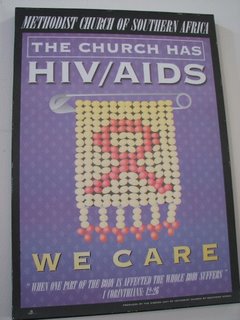 Two statements from my own context that made a significant impact, and generated some discussion, were the Methodist Church of Southern Africa's radical stance in 2005 to adopt the slogan "The Church has AIDS" - this was radical because it spoke of where the Church sees itself located, i.e. among the sick, the suffering, and the needy. It forces us to break down the dividing walls of class, race, gender, and even health! We don't just minister to people who are infected, and affected, by HIV, we are HIV+... Radical! (Thanks to Emily Oliver for the picture).
Two statements from my own context that made a significant impact, and generated some discussion, were the Methodist Church of Southern Africa's radical stance in 2005 to adopt the slogan "The Church has AIDS" - this was radical because it spoke of where the Church sees itself located, i.e. among the sick, the suffering, and the needy. It forces us to break down the dividing walls of class, race, gender, and even health! We don't just minister to people who are infected, and affected, by HIV, we are HIV+... Radical! (Thanks to Emily Oliver for the picture).
Another statement, which I made in relation to our Church's education and training policy, was that when we come to design and formulate our training programs one of our primary questions is "What does the Gospel look like in this situation?" Hence, we do not just ask the traditional knowledge based (content) questions about our theology (i.e., what should the Gospel say?) rather, we ask the contextually motivated mission question, "what would a 'Gospel encountered society' look like? If that is so, then what do we need to do in order to get there?"
This is one of the great blessings of the pragmatic (practical divinity) Wesleyan approach to the world that is expressed in a devotion to Jesus that requires both personal piety and social holiness.
I end with this quote from my paper:
...the gospel of Christ knows no religion but social; no holiness but social holiness. 'Faith working by love' is the length and breadth and depth and height of Christian perfection.
(from Wesley, J. Hymns and Sacred Poems (1739), Pref. 5. Quoted in Baker, F. Practical divinity.)
Labels: AIDS, Oxford Institute, Theology
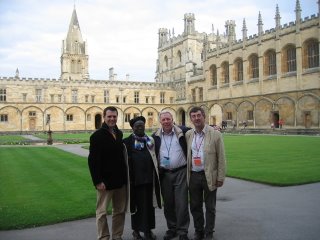
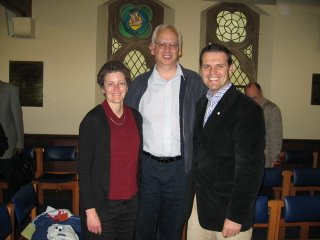
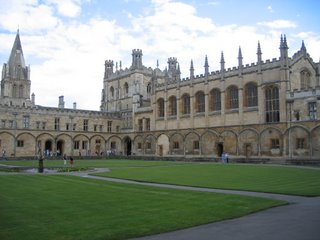
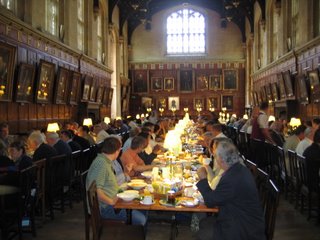




 .
.
 .
.




